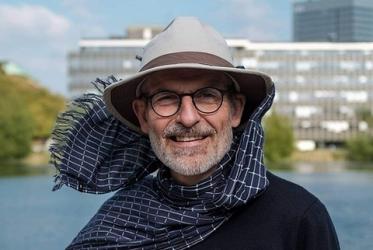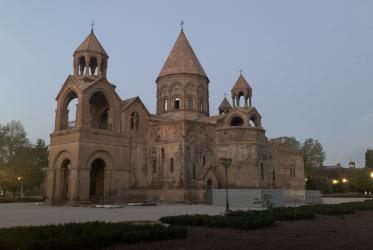Moderator,
Your Eminence Metropolitan Emanuel, President of the Conference of European Churches,
Dear Secretary General, Rev. Dr Guy Liagre,
Respected delegates, observers and guests,
Dear sisters and brothers in Christ,
It is a great honour for me to greet all of you on behalf of the fellowship of the World Council of Churches on this special occasion, the 14th Assembly of the Conference of European Churches. Your many assemblies represent significant contributions to the history of the European churches, but also to the worldwide ecumenical movement. Many of us have been involved in parts of this history. The 10th Assembly in Praha was my first experience of being a delegate in an international ecumenical assembly. In 1992 we celebrated the great changes that had taken place after the fall of the communist regimes and the efforts to reconcile the peoples and nations of Europe. We thanked God for how important CEC had been for the unity of European churches and their joint, significant contribution to the prevailing vision for justice and peace in Europe.
In my former capacity in the Church of Norway, I was responsible for hosting the 12th Assembly of CEC in the long, bright summer days in Trondheim, 2003. We then confirmed Charta Oecumenica, the poignant and broad statement of mutual commitments between the churches of CEC and the Council of the European Bishops' Conference, which is the Catholic counterpart to CEC. These are standing commitments to our call to unity, to share the Gospel in Europe together, to exercise proper attitudes to one another. They call us to be firm witnesses in words and deeds to the values of our Christian faith in our joint work for human rights, strengthening of the life of families, working for reconciliation and engaging in inter-religious dialogue in Europe. We were indeed proud of presenting a Norwegian translation of this statement to the churches in Norway prior to the Trondheim assembly.
As we give thanks to God, being mutually accountable to God and to one another for how we steward this rich legacy, you are gathered here to discern the signs of our time and the will of God for CEC in the years ahead of us. An assembly can never be the assembly of the past but must make its own decisions for today and tomorrow. The churches in Europe look to you these days. The peoples and the leaders of Europe need joint and strong contributions from the Christian churches in Europe. Together the European churches can carry the vision and values of the Christian faith and interpret our living tradition for our time and the time ahead of us. The contributions of the churches are even more needed than before. The churches together in Europe must continue to care for and affirm the Gospel values of human dignity and human rights given by God our creator. We do so in our daily ministry and life as churches and Christians in Europe, in our local communities, and in our advocacy work in the centres of power.
The European churches must together seek and ask for new expressions of solidarity, fellowship and love in a Europe experiencing growing economic disparities, rapidly growing secularization, new challenges between peoples on the move, and a much-changed landscape of different faith communities. If the churches together in Europe do not, in humbleness and commitment, transmit faith in our triune God to the next generation, who will do so? If the churches in Europe together do not carry the legacy of how faith in our Creator compels us to take care of creation, who will? The churches of Europe continue to offer a proper vision for sharing resources within Europe and with other parts of the world. If the churches in Europe do not carry the shared vision of justice and peace as an expression of our faith in Jesus Christ (who blessed those who seek righteousness and are peacemakers), who will do so? In all this, God has given this responsibility to the churches to continue and to further develop our common Christian heritage, so significant for our European continent. Indeed, we share many of these universal values with many others of good will and other faiths, and are also enriched by the significant contribution of immigrants to Europe. And let me particularly mention the contribution of the spirituality of the so-called migrant churches in Europe.
For this work we must empower CEC to serve the churches addressing these callings together. Discussions about the proper stewardship of available resources, a changing strategy, and the proper structures to fill its mandate—these are all needed. As they are in any organization from time to time. But it is also necessary to conclude these discussion and to move out, unleashing your collective resources for the many callings and important work awaiting you.
You are doing this important work in our historical context and at a particular historical moment of Europe, but also in the context of the worldwide ecumenical movement. The churches in the world beyond Europe are also looking to you these days. The World Council of Churches has and will remain a partner in fulfilling your, our, callings. In the WCC we are trying to find new ways of making real our identity as a fellowship of churches. This means that we are not only a global fellowship that needs the continued support of the European churches, but also that with you we seek new ways of doing our programmes together to discern who we are and how we work as churches together. In these efforts, cooperation with the regional expressions of ecumenical life and commitment, such as CEC, will be quite, if not more, significant.
The 14th Assembly of the Conference of the European Churches here in Budapest happens in the context of other ecumenical assemblies in 2013, and particularly I will mention the 10th Assembly of the World Council of Churches in Busan, Korea, in October and November. From what I have said, you understand how much we expect significant contributions from European church life to our defining what our theme means today: God of life, lead us to justice and peace! Your assembly here happens in a year when three other regional ecumenical organizations have held their assemblies. The Pacific Conference of Churches held its assembly in March of this year in Honiara, Solomon Islands, taking the text from Micah 6:8 about seeking what is just in a humble way as its assembly theme. The Latin American Conference of Churches organized its 6th Assembly in May in Havana, Cuba. Its theme was “Affirming an Ecumenism of Concrete Gestures.” One month ago, I attended the All Africa Conference of Churches 10th Assembly in Kampala, Uganda, discussing the theme, God of life, lead Africa to justice, peace and dignity!
It is time to humbly and firmly ask, here in Europe and globally: how do we develop, change and use the gifts that these ecumenical instruments truly are? You are indeed in a constructive sense challenging all of us with your question: So what are we waiting for?
The tasks of the ecumenical movement are indeed waiting to be addressed by us. Each of these five assemblies has on its agenda business sessions dealing with immediate challenges and concerns of the respective ecumenical organizations. They deal as well as with restructuring, so that the ecumenical organization can better respond to the realities in which their member churches are living. But our ecumenical assemblies are more than that. They are celebrations of ecumenical solidarity, feasts of the unity that we as churches are able to witness to each other and together to the world. We have a rich harvest within the ecumenical movement, and we have much more to achieve. These assemblies should strengthen us in our joint pilgrimage, which has unity, justice and peace as its goal, making us ready and able to go to the places and the people where we are most needed. Ecumenical progress is possible if we stay together in our Triune God, carrying together the cross of our risen Saviour Jesus Christ, whom we all witness and worship. Assemblies are indeed needed milestones in our pilgrimage of solidarity in the life of our ecumenical movement.
We now plan together for the future. As General Secretary of the WCC but also as a European, I affirm that we need the most efficient Conference of European Churches possible, wherever you are located, just as we need strong regional ecumenical organizations in all parts of the world. Indeed we benefit from the closeness of our work in Geneva. In the WCC I look for improving cooperation with the Conference of European Churches. The same desire for closer cooperation has been expressed by CEC as well. We issued statements together and we addressed together institutions and governments at the request of our member churches. A joint WCC-CEC delegation composed of high-ranking church officials from the European and the global community visited Greece at the end of last year in order to express solidarity with churches and people there who are facing a deep economic crisis. We met our member churches in Greece and we talked with government officials, valuing what churches in Greece are doing to support people in this difficult time, but also researching possibilities for concrete support from European churches.
As a sign of commitment to our common future, the WCC is present in this assembly with a representative delegation, in addition to the WCC staff responsible for the ongoing relationships with CEC, Father Dr Daniel Buda, and those offering services to facilitate this assembly. WCC is represented here by Dame Mary Tanner from the Church of England, the WCC President for Europe and a well known figure in the ecumenical movement; and also by His Grace Bishop Youannes from the Coptic Orthodox Church, a member of WCC Central Committee. The presence of His Grace Bishop Youannes in this assembly reminds us all of the Middle East and the struggles that our brothers and sisters are going through there, as they search for justice and peace in a turbulent time. Today we pray for his beloved country, Egypt. We also have the honour of the presence of Prof. Dr Park Seong-Won from Korea, a highly experienced ecumenist and a representative of the hosts of the WCC Assembly in Busan, Korea, has also joined the delegation.
We pray with you for a fruitful, peaceful and efficient assembly, where you are open to one another and to the guidance of the Holy Spirit. May God bless CEC, may God bless you, and may God bless Europe through the work that you do during these days!
Yours in our common Lord,
WCC general secretary
Rev Dr. Olav Fykse Tveit



